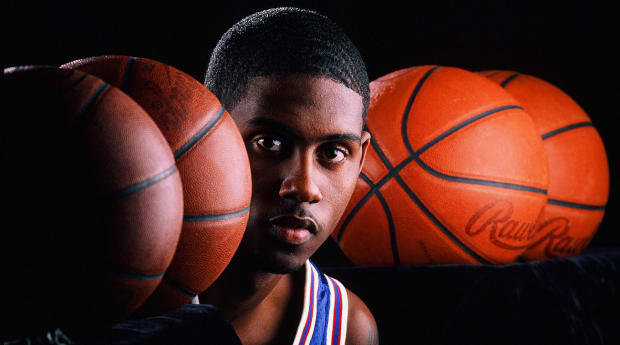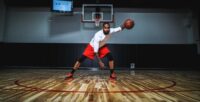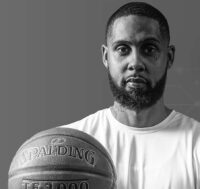Inductees
Larry Hughes

Born: January 23, 1979
On the pages of the local St. Louis paper back in 1989, readers came across this: a black-and-white photo of a 10-year-old dribbling a basketball on an outdoor concrete court at Blewett Middle School, with the shadows – of the ball, the young man’s Nike shoes and lower half of the goal – capturing a day in the life.
Most readers likely skipped to other stories, not realizing that the kid would go on to walk across the sports page years later as one of the city’s biggest basketball stars.
A 6-foot-5 prolific scorer inspired by a younger brother born with a heart defect, Larry Hughes still looks at that photo from time to time and cannot help but smile. “It makes you whole,” he said. “And there are a lot of good things going on in that area now.”
The Missouri Sports Hall of Fame proudly inducted Hughes with the Class of 2021.
He led Christian Brothers College High School to a state championship in 1997, carried Saint Louis University to the NCAA Tournament in his only season there and then became an NBA lottery pick (eighth overall selection) of the Philadelphia 76ers.
In his 14 pro seasons, he helped five teams to the playoffs, including the LeBron James-led Cleveland Cavaliers to the 2007 NBA Finals.
Arguably Hughes’ story isn’t so much of what he accomplished but how he managed to balance the hype.
You see, eight years after his photo ran in the paper, Hughes found himself wanted by almost every major college basketball program in the country ahead of his senior year of 1996-1997.
Ultimately, his finalists were Kansas, Michigan, Syracuse and Illinois – programs that, in the prior decade, had combined for nine NCAA Final Four berths.
“I had a great support system,” said Hughes, a McDonald’s All-American. “My mom handled all of the information and would filter it down to me.”
That proved invaluable. Hughes had attended three different junior high schools. He also played for three different head coaches at CBC.
And yet Hughes put CBC on his shoulders and put the hype to the side. For instance, in the 1997 playoffs, he scored 40 points against Riverview.
“That one is still talked about,” Hughes said. “That game pretty much has legend status here.”
At the time, SLU was coached by Charlie Spoonhour (MSHOF Legend 2019), who had hired CBC coach Derek Thomas after Hughes’ high school freshman season.
Best of all, the Billikens played only 10 minutes away, meaning family and friends could attend every game. His mom, a single parent, was also raising his brother, Justin, born with a heart defect and who later passed away in 2006, at age 20.
“That was really humbling,” Hughes said of the battles his brother endured. “All those things he was dealing with was what kept me going.”
Hughes earned the Conference-USA Freshman of the Year in 1998 after carrying the Billikens to the second round of the NCAA Tournament. He still holds the program’s No. 3 single-game scoring record (40 points), and had four games scoring at least 30 points.
“Coach Spoon was the reason I went there. And they let me have free reign on the court,” Hughes said. “They really had my back.”
He made himself better by hitting the weight room, figuring he could make a difference in the NBA.
Which he did. Hughes averaged almost 14.1 points a game for his career and also was a valuable defender. In 2005, he was selected to the NBA’s All-Defensive Team (first team) after leading the league in steals per game (2.89).
Early on, he listened to veterans such as Scott Williams and Rick Mahorn and coaches such as Larry Brown. Among teammates over the years were Michael Jordan, Allen Iverson, Antawn Jamison and Gilbert Arenas. To Hughes, it wasn’t so much getting to play with those names, but to make an impact alongside them.
“You had to create value for someone to give you an opportunity,” Hughes said.
Drafted by the Philadelphia 76ers, he was on five playoff teams — the 1999 76ers, the 2005 Wizards, the 2006 and 2007 Cavaliers and 2010 Charlotte Hornets.
Since retirement, Hughes has given back. He recently opened a basketball facility, with an admirable goal – to build character among St. Louis youths, not so much to produce blue-chip recruits.
“What I do now,” Hughes said, “is really intended to impart in young people to see what they want to do with their journey.”



